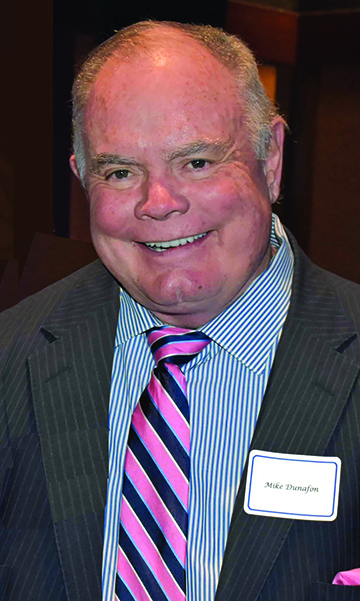Split Decision After Millions Spent And No Fine
by Charles C. Bonniwell

Another Defeat: Mohammad Ali Kheirkhahi one of the principals of MAK faced another defeat when the IEC declined to fine Mayor Mike Dunafon in the case MAK brought against him a decade ago in the IEC.
 After a decade and millions of dollars spent, the Colorado Independent Ethics Commission (the “IEC”) has finally rendered a decision concerning a February 3, 2015, Glendale City Council meeting. The IEC ruled in a split decision that Glendale Mayor, Mike Dunafon, violated Colorado law when he failed to publicly announce at that meeting and two subsequent council meetings that his girlfriend of 15 years, Debbie Matthews, was his girlfriend, notwithstanding the fact everyone in Glendale and at the meeting already knew that fact.
After a decade and millions of dollars spent, the Colorado Independent Ethics Commission (the “IEC”) has finally rendered a decision concerning a February 3, 2015, Glendale City Council meeting. The IEC ruled in a split decision that Glendale Mayor, Mike Dunafon, violated Colorado law when he failed to publicly announce at that meeting and two subsequent council meetings that his girlfriend of 15 years, Debbie Matthews, was his girlfriend, notwithstanding the fact everyone in Glendale and at the meeting already knew that fact.
The Council Meeting
Ms. Matthews had presented a development site plan for a marijuana dispensary next to the nightclub Shotgun Willie’s to the Council. She was the majority owner of both businesses. The IEC found that Mr. Dunafon did not have “a personal or financial interest” in Ms. Matthews’ businesses, nor did he “attempt to influence the other members of the Glendale City Council” regarding Ms. Matthews’ businesses.
But the majority of the IEC declared that Dunafon violated C.R.S. Sec.24-18-109(3)(a) in that he had a “personal or private interest” in Ms. Matthews, and therefore her businesses, and had to publicly declare and disclose that his long-term girlfriend Ms. Matthews was, in fact, his girlfriend.
The IEC declared that no fine would be imposed because of the violation.
In a dissent, Commissioner Cole Wist pointed out that there was no definition of “personal or private interest” which could mean virtually anything. He suggested that it had to mean a “pecuniary” interest. He pointed out in a small town like Glendale (pop. 4496) almost any matter will involve people council members know. Explaining in public any or all connections would be a monumental waste of time and always be subject to second-guessing by anyone unhappy with a decision.
The Backstory
One of the first questions asked by observers of the IEC is why this relatively simple, if strange, decision took the IEC a decade to decide and cost millions of dollars in attorney’s fees and costs for the parties to the litigation. The reason is that nothing in the dark and byzantine world of the IEC is what it appears to be.
The IEC was formed as part of constitutional Initiative 41 titled “Ethics in Government. It was the brainchild of multimillionaire, and now Governor, Jared Polis. It was sold to the voters as a way to strictly limit gifts and gratuities to elected officials. The limitations would be lightly overseen by an independent ethics commission composed of citizens appointed by different political bodies and officeholders.
The IEC was to have a very limited staff and very limited powers. But as with many bureaucratic entities, the IEC has over the years endlessly sought to gain ever expanding powers and potential control over a significant portion of the Colorado citizenry.
It has become a boutique place where political insiders can bring to heel their political enemies which have included the Colorado Secretary of State and even a Governor of Colorado.
Being a boutique operation, the IEC does not have to take any case it doesn’t want to. It can dismiss cases because of “lack of jurisdiction” or it being “frivolous” with no explanation for the decision.
The Glendale Case

Winning Resolve: Glendale Mayor Mike Dunafon and the City of Glendale continue to refuse to give into the tactics of the IEC.
The Glendale case in the IEC had its genesis in a political war started by the Iranian owners (MAK Investors) of Authentic Persian and Oriental Rugs at the corner of Colorado Boulevard and Virginia Avenue. MAK wanted to take the 5.4 acres of land it had acquired from its landlord and make a fortune by building huge skyscraper apartment houses and condominiums along Cherry Creek.
The only problem was the land was not zoned for such development and their project was widely opposed by Glendale residents. MAK, used to playing extreme hardball to get what it wanted, commenced a war with the town’s mayor, Mike Dunafon, and the City Council. MAK hired the powerhouse law firm of Ireland Stapleton to bring a myriad of highly expensive lawsuits in state and federal courts against the city. MAK also hired the far right-wing paramilitary group The Oath Keepers to march fully armed through the streets of Glendale to intimidate the citizens and then to march to City Hall to harass the mayor and city council at a council meeting.
The rug merchants also went to the Denver FBI, who were rumored to have informants and agents within The Oath Keepers, to see if it could get the federal government involved to pressure Glendale to grant the rezoning MAK needed for its skyscrapers.
MAK, after years of litigation, lost all of its lawsuits brought by Ireland Stapleton and the city continued to refuse MAK’s rezoning demands. But MAK had one more arrow in its quiver. Bernie Buescher, a lawyer at Ireland Stapleton, had been Acting Secretary of State of Colorado and was reputed to know how to use the IEC to attack political enemies.
MAK poured over the minutes of the meetings of Glendale City Council to try to find anything it could use for a complaint to the IEC. MAK came across the February 3, 2015, minutes and thought they could use it in the MAK battle plan to force a rezoning for its skyscrapers.
MAK brought its complaint to the IEC almost a decade ago.
IEC’s Interest In Glendale Case
The IEC itself had no real interest in MAK’s push to make Glendale rezone its property but took the case, and is believed, to be a political favor to Bernie Buescher. However, the IEC came to see the Glendale case and saw it as a vehicle to expand its power over home rule counties and municipalities in Colorado, which includes almost all larger cities and counties in the State.
The major impediment to the expansion of IEC power was the express provision in Section 7 of the enabling provision which states:
“Any county or municipality may adopt ordinances or charter provisions with respect to ethics matters that are more stringent than any of the provisions contained in this article. The requirements of this article shall not apply to home rule counties or home rule municipalities that have adopted charters, ordinances, or resolutions that address the matters covered by this article.”
To get around this limitation to its powers the IEC came up with a strategy to accept cases against elected officials from small municipalities and counties that had their own ethics codes, since these entities do not have millions of dollars to fight off a claim of IEC jurisdiction over them.
Infamously the IEC went after County Commissioner Julie Cozad from a home rule county. To receive a plea deal, the IEC got her to concede the IEC had jurisdiction over the county.
The IEC then decided to accept a case concerning Dunafon as a mayor of a small home rule city assuming a small town like Glendale (pop. 4,496) would not have the resources to protect its own mayor on the jurisdiction question. But the IEC was badly mistaken as Glendale has an extremely large tax base for a small city and a history of fighting off governmental bullies like the IEC. Now, 10 years and millions of dollars spent, Glendale forced the IEC to make a ruling. Some IEC observers wondered why the IEC imposed no penalty against Mayor Dunafon even though it found a violation. Was the IEC trying to be magnanimous? The IEC was most likely anxious to penalize Dunafon to the maximum amount possible. But if it imposed a fine, no matter how small, its actions could be subject to review by the courts.
The IEC Wants To
Avoid The Courts At All Costs
The IEC has asserted that as the IEC was created by an amendment to the State Constitution, state laws and the state legislature have no power to constrain the IEC. The IEC asserts that no ethics rules apply, including the Colorado Open Record Act and Colorado Open Meetings Act. Thus, it believes only the Colorado judiciary could possibly limit its power grab and thus the courts must be avoided at all costs.
With a decision made in the Glendale case it would normally be subject to judicial review. But the IEC came up with an ingenious legal argument that the court could review decisions only in cases that the IEC imposes a penalty. In the Glendale case the IEC has argued that since it imposed no fine on Mayor Dunafon no court could review the Glendale case.
Ever More Litigation
Glendale does not intend to give in to such legal sophistry and now has brought an action under Section 106 of the Colorado Rules of Civil Procedure to a Colorado District Court on whether the IEC has jurisdiction over home rule cities.
Whatever the District Court rules, the decision will be appealed to the Colorado Court of Appeals and then eventually to the Colorado Supreme Court. Is decades of litigation and millions in attorney fees and costs what the Colorado voters envisioned when it approved the “Ethics in Government Act” in 2006?
Probably not, but as Lord Acton noted, power corrupts and absolute power corrupts absolutely. The IEC in seeking a form of absolute power is revealing how corrupt the IEC has become.
